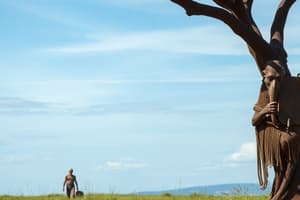Podcast
Questions and Answers
A researcher aims to understand the cultural practices surrounding death and burial in a remote island community. Which branch of social science is most suitable for this research?
A researcher aims to understand the cultural practices surrounding death and burial in a remote island community. Which branch of social science is most suitable for this research?
- Archaeology
- Economics
- Political Science
- Cultural Anthropology (correct)
Which of the following research questions aligns best with the focus of macroeconomics?
Which of the following research questions aligns best with the focus of macroeconomics?
- What impact do individual consumer preferences have on demand for electric vehicles?
- How does a firm decide on the optimal price for its product?
- What is the impact of government spending on the overall GDP growth rate? (correct)
- How does a household allocate its budget between housing, food, and recreation?
A geographer is studying the impact of deforestation on local weather patterns and water resources. Which branch of geography is most relevant to this study?
A geographer is studying the impact of deforestation on local weather patterns and water resources. Which branch of geography is most relevant to this study?
- Physical Geography (correct)
- Urban Geography
- Political Geography
- Human Geography
A historian is analyzing the role of trade networks in the spread of technological innovations during the Bronze Age. Which discipline would provide the most direct evidence to support or refute their claims?
A historian is analyzing the role of trade networks in the spread of technological innovations during the Bronze Age. Which discipline would provide the most direct evidence to support or refute their claims?
Which social science discipline primarily focuses on the study of how language shapes social interactions and cultural identity?
Which social science discipline primarily focuses on the study of how language shapes social interactions and cultural identity?
A government is trying to decide whether to increase taxes or cut spending to reduce the national debt. Which field of social science would be most helpful in analyzing the likely effects of these policies?
A government is trying to decide whether to increase taxes or cut spending to reduce the national debt. Which field of social science would be most helpful in analyzing the likely effects of these policies?
An archaeologist discovers a burial site with elaborate grave goods, indicating a hierarchical social structure. Which of the following inferences can they reasonably make based on this evidence?
An archaeologist discovers a burial site with elaborate grave goods, indicating a hierarchical social structure. Which of the following inferences can they reasonably make based on this evidence?
A city planner is designing a new public transportation system and wants to understand how people's travel patterns and residential choices are influenced by the location of jobs, amenities, and housing prices. Which field of social science is most relevant to this study?
A city planner is designing a new public transportation system and wants to understand how people's travel patterns and residential choices are influenced by the location of jobs, amenities, and housing prices. Which field of social science is most relevant to this study?
Which discipline most directly applies statistical methods to forecast future healthcare needs based on population aging?
Which discipline most directly applies statistical methods to forecast future healthcare needs based on population aging?
A researcher aims to understand how cultural norms influence voting patterns. Which field would offer the most direct framework for this research?
A researcher aims to understand how cultural norms influence voting patterns. Which field would offer the most direct framework for this research?
A city planner needs to analyze crime hotspots to optimize resource allocation. Which tool would be MOST suitable for this?
A city planner needs to analyze crime hotspots to optimize resource allocation. Which tool would be MOST suitable for this?
Evaluating the impact of globalization on local cultures primarily requires insights from which combination of disciplines?
Evaluating the impact of globalization on local cultures primarily requires insights from which combination of disciplines?
To investigate the psychological effects of long-term social isolation, which research approach would be most appropriate?
To investigate the psychological effects of long-term social isolation, which research approach would be most appropriate?
Which field is most concerned with the systematic study of changes in population size and composition over time?
Which field is most concerned with the systematic study of changes in population size and composition over time?
A legal scholar is researching the historical context surrounding the establishment of a particular law. Which resources would be most valuable?
A legal scholar is researching the historical context surrounding the establishment of a particular law. Which resources would be most valuable?
Understanding how social media influences political polarization requires integrating insights from which fields?
Understanding how social media influences political polarization requires integrating insights from which fields?
To accurately transcribe and analyze spoken dialects within a specific region, which area of study is essential?
To accurately transcribe and analyze spoken dialects within a specific region, which area of study is essential?
A sociologist wants to study the impact of urban planning on community cohesion. Which research method would be most suitable?
A sociologist wants to study the impact of urban planning on community cohesion. Which research method would be most suitable?
Flashcards
Social Science
Social Science
The study of society and relationships among individuals.
Anthropology
Anthropology
Study of humans, past and present, through culture, biology, language, and archaeology.
Cultural Anthropology
Cultural Anthropology
Branch of anthropology exploring how different people live and understand the world.
Archaeology
Archaeology
Signup and view all the flashcards
Economics
Economics
Signup and view all the flashcards
Microeconomics
Microeconomics
Signup and view all the flashcards
Macroeconomics
Macroeconomics
Signup and view all the flashcards
Geography
Geography
Signup and view all the flashcards
Geographic Information Systems (GIS)
Geographic Information Systems (GIS)
Signup and view all the flashcards
History
History
Signup and view all the flashcards
Law
Law
Signup and view all the flashcards
Linguistics
Linguistics
Signup and view all the flashcards
Political Science
Political Science
Signup and view all the flashcards
Psychology
Psychology
Signup and view all the flashcards
Sociology
Sociology
Signup and view all the flashcards
Phonetics
Phonetics
Signup and view all the flashcards
Morphology
Morphology
Signup and view all the flashcards
Study Notes
- Social science examines society and the relationships among individuals.
- It includes many branches, each focusing on a particular area.
- Branches encompass anthropology, archaeology, economics, geography, history, law, linguistics, political science, psychology, sociology, and demography.
- Social science aids in understanding societal functions.
Anthropology
- Anthropology studies humans, both past and present.
- It uses a broad method for understanding different aspects of human experiences.
- Cultural anthropology studies how individuals in different places understand the world focusing on culture, practices, values, and social structures.
- Biological anthropology studies the biological and behavioral aspects of humans, ancestors, and related primates.
- Linguistic anthropology studies the role of language in social life.
- Archaeology studies human history via excavation and analysis of physical remains.
Archaeology
- Archaeology studies human history and prehistory by excavating sites and analyzing artifacts/remains.
- Archaeologists recover and analyze material remains to understand cultures and societies.
- It needs systematic excavation, documentation, and interpretation of artifacts.
- Dating methods determine the age of artifacts and sites.
- Archaeological findings help understanding of human behavior, social structures, and cultural changes.
Economics
- Economics studies how societies allocate limited resources.
- It focuses on the production, distribution, and consumption of goods and services.
- Microeconomics studies the behavior of individuals, households, and firms regarding resource allocation.
- Macroeconomics examines the behavior of the economy as a whole, including inflation, unemployment, and economic growth.
- Core economic concepts are supply and demand, market equilibrium, elasticity, and opportunity cost.
Geography
- Geography studies the Earth's surface, distribution of features, and human-environment interactions.
- Physical geography focuses on the natural environment, examining climate, landforms, vegetation, soils, and water resources.
- Human geography examines organization of human activities and interactions with their environment.
- Geographic Information Systems (GIS) are used to analyze and visualize spatial data.
- Geographers study urbanization, migration, globalization, and environmental sustainability.
History
- History is the study of the past.
- It involves examining and interpreting past events, people, and societies.
- Historians use primary (documents, artifacts) and secondary sources (books, articles) to analyze the past.
- Differing historical perspectives and interpretations reflect diverse viewpoints and biases.
- History helps to understand how the past shaped the present and provides insights into the future.
Law
- Law is a system of rules enforced by a governing authority to regulate behavior and maintain social order.
- It includes criminal, civil, constitutional, and international law.
- Legal systems vary across countries and jurisdictions.
- Law provides a structure for resolving disputes, protecting rights, and ensuring justice.
- Legal studies involve analyzing legal principles, institutions, and processes.
Linguistics
- Linguistics is the scientific study of language.
- It examines the structure, sounds, meaning, and use of language.
- Phonetics studies language sounds, while phonology examines sound organization.
- Morphology studies word structure, and syntax examines word combinations.
- Semantics studies meaning in language, and pragmatics examines how context contributes to meaning.
Political Science
- Political science studies politics, government, and political behavior.
- Examines the theory/practice of politics, including political systems, ideologies, institutions, and processes.
- Political scientists study elections, public opinion, parties, groups, and international relations.
- Comparative politics analyzes different political systems and institutions.
- Political theory explores questions about politics, like justice, rights, and power.
Psychology
- Psychology is the scientific study of the mind and behavior.
- It covers perception, cognition, emotion, motivation, and social behavior.
- Clinical psychology focuses on diagnosing/treating mental disorders.
- Developmental psychology studies how people grow and change.
- Social psychology studies how individuals are influenced by others.
Sociology
- Sociology studies society, social interactions, and phenomena.
- It examines social structures, institutions, organizations, and groups.
- Sociologists study social inequality, social change, crime, deviance, and family.
- Major perspectives include functionalism, conflict theory, and symbolic interactionism.
- Research methods include surveys, interviews, experiments, and participant observation.
Demography
- Demography is the statistical study of human populations.
- It examines population size, structure, distribution, and changes over time.
- Demographers study birth, death, and migration.
- Demographic data is used for planning/policy in healthcare, education, and social welfare.
- Key indicators are birth rates, death rates, fertility rates, and life expectancy.
Studying That Suits You
Use AI to generate personalized quizzes and flashcards to suit your learning preferences.




